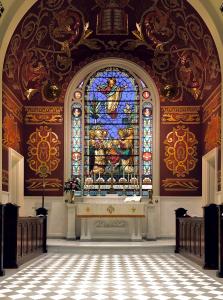I’m not too far in to Untamed by Glennon Doyle Melton. I’m going slow because I have to stop every few minutes and roll my eyes. Pretty much I’m reading it so that you don’t have to, which I feel like is super nice of me. Also, today is fake Ascension, if you’re a liturgically minded person. Maybe you celebrated on Thursday (as I did) but maybe you forgot and are transferring the feast to today. It’s ok, not everyone can be as holy as I am or as wild as Glennon.
So, the Ascension, as many people have noted for the last two thousand years, was kind of a big deal. It has to do with the work Jesus did on the cross, establishing peace with God in his own blood for those who believe, and the work he continues to do with the Father, interceding for his own, and the coming of the Holy Spirit which is an eminently good thing for those who love Jesus—though, perhaps it feels mean. “I will not leave you as orphans,” says Jesus, and then he leaves, and my immediate thought is, “I’m totally an orphan now” but really I’m not, because of the Holy Spirit. The trouble, though, is that I can’t see Jesus. And sight is such a basic element of life. It’s what you might call “essential,” like church. If you can’t see it means many other supports have to be rallied so that catastrophe doesn’t befall you.
Glennon, in Untamed, takes this concept of sight and faith and subverts it so entirely that it comes to mean and to represent something else entirely. She says this:
In fact, my favorite idea of faith is a belief in the unseen order of things. There are two orders of things: There is the seen order unfolding in front of us every day on our streets and in the news. In this visible order, violence reigns and children are shot in their schools and warmongers prosper and the 1 percent of the world hoards half of all we have. We call this order of things reality. This is “the way things are.” It’s all we can see because it’s all we’ve ever seen. Yet something inside us rejects it. We know instinctively: This is not the intended order of things. This is not how things are meant to be. We know that there is a better, truer, wilder way.
That wild thing, of course, permeates the book, which is a subject for another day. She goes on:
That better way is the unseen order inside us. It is the vision we carry in our imagination about a truer, more beautiful world—one in which all children have enough to eat and we no longer kill each other and mothers do not have to cross deserts with their babies on their backs. This better idea is what Jews call shalom, Buddhists call nirvana, Christians call heaven, Muslims call salaam, and many agnostics call peace. It is not a place out there—not yet; it’s the hopeful swelling in here, pressing through our skin, insisting that it was all meant to be more beautiful than this. And it can be, if we refuse to wait to die and “go to heaven” and instead find heaven inside us and give birth to it here and now. If we work to make the vision of the unseen order swelling inside us visible in our lives, homes, and nations, we will make reality more beautiful. On earth as it is in heaven. In our material world as it sin our imagination.
Of course, for Glennon, this includes indulging in an unabashed lesbian marriage and rewriting the meanings of the usual words like “love” and “faith.” It doesn’t include getting to know any of the gods she so haphazardly jumbles together, as if the “peace” offered by a Muslim, a Buddhist, a Christian, a Jew, and an Agnostic could possibly be recognizable one unto the other. Besides the deeply disrespectful convention of announcing to people of many different faiths that essentially they all believe the same thing, when none of them would say that they do, there is the curious idea that you can reorder the world based on the swelling of your own “imagination.” Your sense of beauty, weaponized to bring about “heaven on earth,” is apparently a good thing, not blasphemous, not even, in its specious wildness, brazen, like a golden cow.
But Glennon is getting at something very true, though twisted into an unrecognizable shape. And that is the deep discomfort human people feel about being human. It was supposed to “be more beautiful than this.” And we have a very good reason for why it isn’t—sin, rebellion, violence—all of which belong to us, all of which swell up from inside and spill over and out into the “visible” order, bringing not utopia and beauty, but dystopia and ruin.
If you did care about Jesus, though, you would know something about the seen and the unseen. Because, when you fix your way to him, he brings about the thing for which Glennon so longs—though not in the way she would understand or be able to accept it. When Jesus sits down at the right hand of the Father (because his work is finished) he leans over close and “intercedes” for us. That is, he constantly brings his own before the Father, hearing their prayers, answering their prayers, tethering them in his own body to the very throne of God. You wandering around down here may be your “seen order of things,” but the greater and truer reality that you cannot see is that you are right now present before the throne of God because you are incorporated into the mystical body of the Son. The “unseen” is real even though you can’t see—and here’s the kicker—or feel it.
There you are in heaven with Jesus at the same time that you are here on earth. And Jesus is also here on earth with you because the Holy Spirit lives in you, and God does not carve himself into bits as people do. God has made you his tabernacle. You don’t need to trudge up to the temple, you don’t need to “wait to go to heaven,” because God is alive inside of your body, mind, and soul, reintegrating you, remaking you, restoring you, and renewing you. He is preparing a room for you in the new heavens and the new earth, and at the same time, you are the room he has prepared for himself. There is no disconnection, no orphan-hood, no alienation, no being alone.
You can’t feel it all the time, and you cannot see it, but it does turn over your life. It does bring about a deep peace that the world cannot see and cannot understand. It does enliven you and quicken you to good works and obedience to the Law. It does scrub away the stain of sin and stench of death. You are now an outpost of the kingdom of God, living in a foreign, treacherous, and combative world, wishing everybody didn’t hate you. Meanwhile a similarly violent war goes on inside of you as God lays claim to the totality of your soul and remakes all your desires into the image of the Son.
The question of beauty is the key, of course. While you are fussing over the visible ugliness of the world in which you live, God is fussing over the internal ugliness of your soul. You would like him to solve the problems of abuse, gun-violence, famine, covid, racism, and evil in general, but he spends all his time persecuting you about your unforgiveness, unkindness, distrust, short temper, gossiping habits, sexual proclivities, ruinous desires, how you’re using your money and worse, your time—all these nitpicky annoyances, when you would rather be free and wild, raging over the world like a golden cow-cheetah.
Anyway, don’t fret. Wherever you are today, probably still on your couch, probably still disappointed, cast your spiritual mind’s eye up to that glorious throne which you cannot even imagine, and know that your Savior is there, bringing you constantly before the attention of the Father, even as the Spirit sweeps the dirt and grime out of your mind, rearranging the furniture, adjusting the lighting so that your very soul is a thing of beauty, so that when we all do finally get to see each other face to face, we will recognize the astonishing glory of Christ himself.













